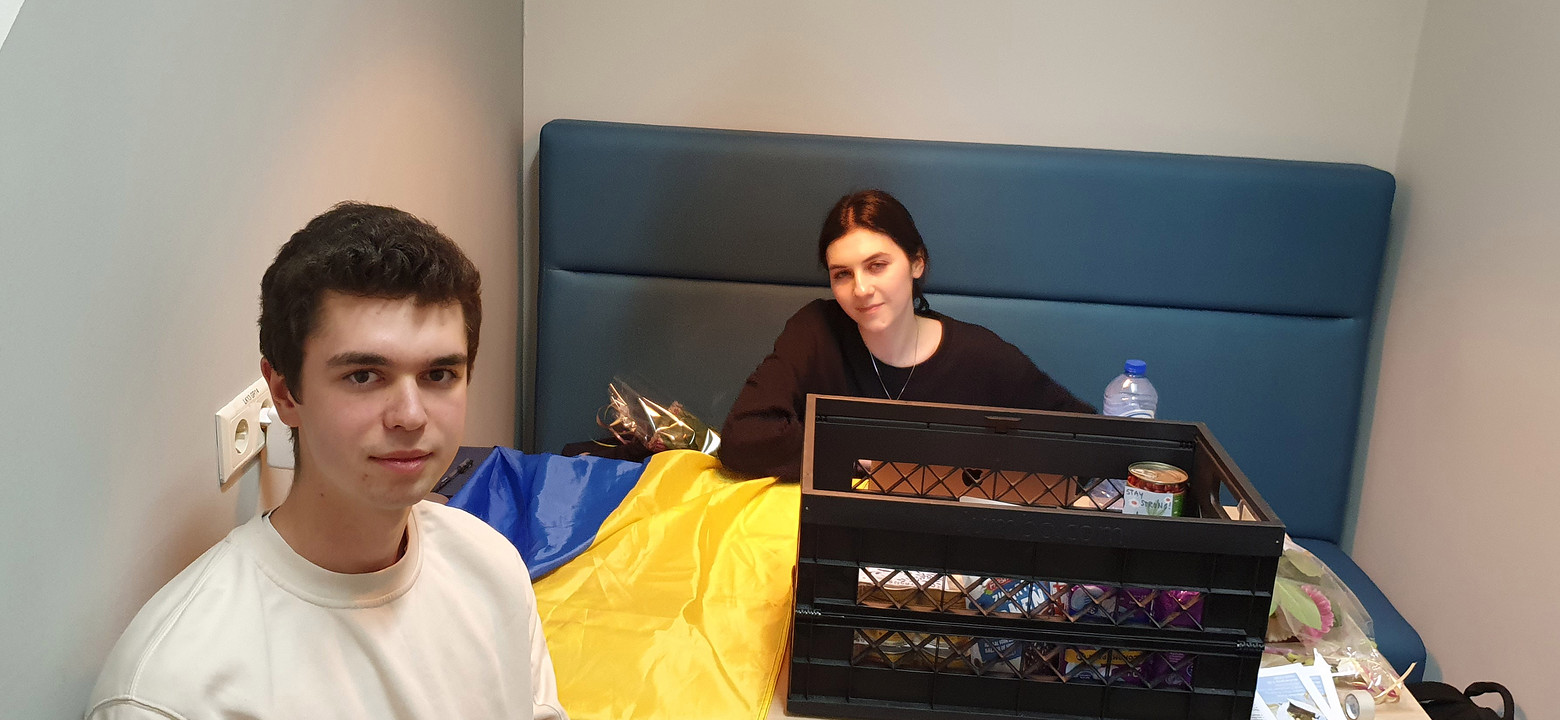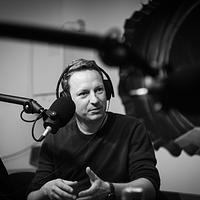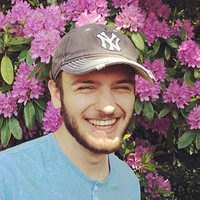Aid for Ukraine from Saxion is on its way: Oleksandr Kuprii (18) and about ten fellow students are coordinating an aid action and collecting necessary items from a tiny room in the main building in Enschede. Donations can be made from 10 a.m. to 5 p.m. in Wolvecamp 2.29A. "This is all we can do from here."
This article is also available in Dutch
As a kind of cynical joke, Oleksandr Kuprii and his Ukrainian friends no longer talk about Monday, Tuesday or Wednesday. "It's the sixth day," we then say to each other, says the first-year Applied Computer Sciences student. The sixth day since he was awakened at five in the morning by a calling friend, and a phone that then overflowed with messages. "It's war, they said. I could hardly understand what was going on."
His hometown is Bucha, a city of about 40,000 inhabitants about 20 kilometers from the capital Kiev, which he left for Enschede in August of last year. He brings out his telephone, in the normally dull, but especially now, safety of an average Saxion office. The device is his lifeline, for example, to his parents, who have fled to the relatively safe western Ukraine. "My parents are not military people. Fleeing was the only thing they could do: it became too dangerous."
But his phone is now also his connection to 24/7 newsfeeds and witness accounts. A video appears on his screen, of what is roughly the main street of his hometown. Or rather, was the main street. Dozens of yards of stranded tanks, broken street and destroyed houses. The destruction is everywhere and immense.
He is silent for a moment and then shows another image from Google Maps, just to underline: this is how it was, a neat green street.
Bucha is five kilometers from Hostomel airport and apparently of strategic interest, and it is therefore one of the most heavily fought cities in Ukraine. That he is here and knows his city will never be the same is tough, says Oleksandr, who speaks mainly by remaining silent.

Oleksandr Kuprii (links) and Ruslana Bosakevych (2nd year Fashion & Textile Technologies), in W2.29A.
Distraction
Last week he had vacations, now he is attending lectures again. It may feel strange, now that his homeland is on fire, and complicated it is too. At the same time: "It may be crazy to say, but it is also a distraction."
From Saxion, the students are getting all the support they need, Oleksandr says. "I have been emailed by my study coach, by someone from the academy, and have asked teachers for some postponement. That was no problem at all."
He and his fellow Ukrainian students are in close contact with their fellow countrymen in Enschede, a fairly large community according to Oleksandr. Last Saturday they demonstrated in Enschede, Sunday they were in Amsterdam.
To make as many people as possible aware of what is actually going on in their country, he says. "This is not a military parade, not a show. This is real war. And it's pure terrorism; a lot of the actions of the Russians are purely about scaring people."
Donate
Raising awareness is not the only thing they do. The Saxion students are in close contact with Twente for Ukraine, and have now started their own aid campaign, from Saxion. With a group of ten students ("and it's still growing") they collect stuff for Ukraine at Saxion, which from there go to the central location at the Getfertsingel in Enschede. From there the goods go by car to Ukraine. They are very much needed there, according to Oleksandr.
Will the war be over soon? He hardly dares to speculate. "It's mostly hoping," he says. "Hoping that it's over as soon as possible, maybe it's over soon. In the meantime, this is all we can do from here."
Want to donate? You can.
From 10 a.m. to 5 p.m., students will be at Wolvecamp 2.29a. Especially needed are medicines, clothing, food, but also for example cell phones. They will take care of getting the stuff from Saxion to the central collection location at Getfertsingel. Here is a complete list.
Want to contribute financially? Via this link
You can also email Oleksandr Kuprii: [email protected]
Yevhenii “Eugene” Derevianko (3rd year CMGT): The sky being red from all the rockets was already a familiar sight to me”
By Joris Kok
Yevhenii “Eugene” Derevianko, a third-year Creative Media & Games Technology student from Ukraine, could barely keep his eyes off of his news feeds the first days. Like many, he was worried about his family when the invasion started. “I woke up at 4 AM by my sister calling me, who was out of the city at her boyfriend’s family. My family was there as well because they didn’t know what would happen.”
Eugene’s family live in Kyiv, which is one of the main targets of the Russian military. Many families had to flee the city, not knowing which parts would be bombed or attacked. But once his family heard that only the centre of the city would be attacked, they could safely return to their home. They live in a building with a two-story deep parking space, which they’re using for potential shelter. “As much as you can say ‘safe’, they are safe”, he says. “If anything happens, they’ll have time to get to safety.”
Eugene now gets updates and pictures from his family, showing them getting groceries, and living their lives as usual. “Seeing them just be safe and fine calmed my nerves a lot.” This situation is nothing new for him, as he is from Kramatorsk, in the East of Ukraine. An area already affected by the Russian invasion of Ukraine in 2014. “The sky being red from all the rockets was already a familiar sight to me.”
“Stay out of the situation”
Eugene lives in the centre of Enschede but visited his family in Kyiv and his grandmother in Kramatorsk last Christmas. He grew up there for most of his life and moved to Kyiv only later. Regardless, he has an emotional attachment to the city and is very sad about not seeing his family right now. Despite that, his family is happy that he is not involved in the war. “They keep saying: ‘Don’t you dare skip learning Dutch!’. They want me to stay out of the situation and keep developing myself in the Netherlands.”
Eugene is grateful that he can stay here and work, and finds it to be the best way to support his family right now. “I actively want to be out of this war. I am not a nationalist, I love the country, and I love most people there. I love the nation and everything, but I wouldn’t want to stay there for my whole life.”
Saxion has 75 Ukrainian students and 50 Russian students. One of Eugene’s best friends here in Enschede comes from Moskou. “He’s also scared of the situation right now. No one wants war, and the citizens of Russia are not responsible for this war.” When asked if he’d ever join the fight, Eugene says it’s a touchy subject. “I don’t want to die, obviously, but I cannot say if I want to join the fight there or not. So the whole situation is very confusing.”
Gerelateerde artikelen
Bye bye koffiepas; nog in de eerste helft van volgend jaar tappen met je toegangstag
Vanaf volgende week parkeer je in Deventer niet meer met je parkeerpas, maar met dezelfde ‘tag’ waarmee je deuren opent. In Enschede was dit al vanaf augustus zo. Doei overbodige pasjes. Maar vanaf wanneer kun je ook koffie tappen en printen met je tag?
SaxPraat: Rookgordijn
Roken op het terrein van Saxion is sinds 2020 wettelijk verboden, maar toch wordt er nog regelmatig gepaft en gevaped op bijvoorbeeld het schoolplein. Verslaggevers Fabian en Eline gingen op onderzoek uit. Wat vind jij dat Saxion hieraan moet doen?
Comic Stefanie: Open Dag
In haar nieuwste comic gaat Stefanie Heil in op het begrip Open Dag.

